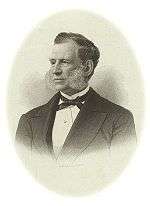William E. Dodge
| William E. Dodge | |
|---|---|
|
Businessman, industrialist, Congressman, founding member of Young Men's Christian Association | |
| Born |
William Earle Dodge September 4, 1805 Hartford, Connecticut |
| Died |
February 9, 1883 (aged 77) New York City, New York |
| Cause of death | Heart attack |
| Resting place | Woodlawn Cemetery |
| Residence | 225 Madison Ave., Manhattan |
| Occupation | Industrialist, Congressman |
| Known for | Co-founder Phelps Dodge Mining Corporation |
| Political party | Republican |
| Spouse(s) | Melissa Phelps (died 1903) |
| Children |
William Earl Dodge Jr. Anson G. P. Dodge Reverend David Stuart Dodge General Charles C. Dodge Norman White Dodge George E. Dodge Arthur M. Dodge |
William Earle Dodge Sr. (September 4, 1805 – February 9, 1883) was a New York businessman, referred to as one of the "Merchant Princes" of Wall Street in the years leading up to the American Civil War. Dodge saw slavery as an evil to be peaceably removed, but not to be interfered with where it existed.[1][2] He was a Native American rights activist and served as the president of the National Temperance Society from 1865 to 1883. Dodge represented New York's 8th congressional district in the United States Congress for a portion of the 39th United States Congress in 1866-1867 and was a founding member of the Young Men's Christian Association (YMCA). His son, Charles Cleveland Dodge, was one of the youngest brigadier generals in the Union Army during the Civil War at the age of twenty-one.
Biography
Dodge was born in Hartford, Connecticut, the second son of David Low Dodge, founder of the New York Peace Society, and his wife Sarah Cleveland, the daughter of minister Aaron Cleveland.[3][4] He married Melissa Phelps (1809–1903), the daughter of Anson Green Phelps and Olivia Egleston. The couple had seven sons. In 1833, Dodge and his father-in-law founded the trading firm Phelps, Dodge and Company. In 1908 they became one of Americas largest mining companies Phelps Dodge Corporation.
Dodge is the namesake of Dodge County, Georgia.[5] A consortium of businessmen led by Dodge purchased large tracts of timberland in this area following the Civil War. The Dodge Land Company laid claim to over 300,000 acres (1,200 km2) of land through questionable land deeds.[6] The consortium's ownership of these lands led to land wars which resulted in nearly fifty years of court cases.
Dodge and his associates built the Macon and Brunswick Railroad, connecting Macon to what was then a remote area of the state. Dodge County was formed in 1870 and Eastman, the county seat, was established at the railroad's Station Number 13. Dodge visited the area only once, to dedicate a two-story courthouse that he donated to the county. Dodge's sons later administered the timber businesses in this area.
Dodge was active in the post-Civil War Indian reform movement.[7] He joined Peter Cooper in organizing the privately funded United States Indian Commission in 1868 and helped institute Ulysses S. Grant's Peace Policy toward the Indians. In 1869, Dodge toured Indian Territory (present-day Oklahoma) and Kansas as a member of the government-sponsored Board of Indian Commissioners. He met and discussed U.S. Indian policy with representatives of the Cheyenne, Arapaho and Kiowa. Dodge lobbied for the prosecution of the U.S. cavalry commanders responsible for the 1870 Marias Massacre in Montana, which left 173 Blackfeet dead. Dodge unsuccessfully campaigned to establish a cabinet-level department for Indian Affairs. He also used his influence in Washington on behalf of Indian educational programs and the General Allotment Act of 1887. A monument to William E. Dodge stands on the North side of Bryant Park.
Dodge was a founding member of the Board of Trustees for the Syrian Protestant College, later renamed the American University of Beirut. As Treasurer, he laid the cornerstone of College Hall, the first building on the present campus in Ras Beirut, on December 7, 1871.[8]
His eldest son, William Earl Dodge Jr., assumed control of the Phelps Dodge company after his death.
| Family Tree of William Earl Dodge[9] | |||||||||||||||||||||||||||||||||||||||||||||||||||||||||||||||||||||||||||||||||||||||||||||||||||||||||||||||||||||||||||||||||||||||||||||||||||||||||||||||||||||||||||||||||||||||||||||||||||||||||||||||||||||||||||||||||||||||||||||||||||||||||||||||||||||||||||||||||||||||||||||||||||||||||||||||||||||||||||||||||
|---|---|---|---|---|---|---|---|---|---|---|---|---|---|---|---|---|---|---|---|---|---|---|---|---|---|---|---|---|---|---|---|---|---|---|---|---|---|---|---|---|---|---|---|---|---|---|---|---|---|---|---|---|---|---|---|---|---|---|---|---|---|---|---|---|---|---|---|---|---|---|---|---|---|---|---|---|---|---|---|---|---|---|---|---|---|---|---|---|---|---|---|---|---|---|---|---|---|---|---|---|---|---|---|---|---|---|---|---|---|---|---|---|---|---|---|---|---|---|---|---|---|---|---|---|---|---|---|---|---|---|---|---|---|---|---|---|---|---|---|---|---|---|---|---|---|---|---|---|---|---|---|---|---|---|---|---|---|---|---|---|---|---|---|---|---|---|---|---|---|---|---|---|---|---|---|---|---|---|---|---|---|---|---|---|---|---|---|---|---|---|---|---|---|---|---|---|---|---|---|---|---|---|---|---|---|---|---|---|---|---|---|---|---|---|---|---|---|---|---|---|---|---|---|---|---|---|---|---|---|---|---|---|---|---|---|---|---|---|---|---|---|---|---|---|---|---|---|---|---|---|---|---|---|---|---|---|---|---|---|---|---|---|---|---|---|---|---|---|---|---|---|---|---|---|---|---|---|---|---|---|---|---|---|---|---|---|---|---|---|---|---|---|---|---|---|---|---|---|---|---|---|---|---|---|---|---|---|---|---|---|---|---|---|---|---|---|---|---|---|---|---|
| |||||||||||||||||||||||||||||||||||||||||||||||||||||||||||||||||||||||||||||||||||||||||||||||||||||||||||||||||||||||||||||||||||||||||||||||||||||||||||||||||||||||||||||||||||||||||||||||||||||||||||||||||||||||||||||||||||||||||||||||||||||||||||||||||||||||||||||||||||||||||||||||||||||||||||||||||||||||||||||||||
References
- ↑ Dodge, D, Stuart (1887). Memorials of William E. Dodge. New York: Randolph. p. 73.
- ↑ Martyn, Carlos (1890). William E Dodge, The Christian Merchant. New York: Funk & Wagnall. p. 183.
- ↑ The Descendants of John Porter of Windsor, Conn. 1635-9, Volume 1 retrieved January 19, 2013
- ↑ The Dodge Family Association: "David Low Dodge Jr." retrieved January 19, 2013
- ↑ Gannett, Henry (1905). The Origin of Certain Place Names in the United States. Govt. Print. Off. p. 107.
- ↑ pg.444 "The New Georgia Guide"
- ↑ Dodge, D Stuart (1887). Memorials of William E Dodge. New York: Anson D F Randolf. p. 166. Retrieved 30 November 2014.
- ↑ "History of the American University of Beirut, AUB, Lebanon". January 9, 2009. Retrieved 2009-01-28.
- ↑ Dodge, Phyllis (1987). Tales of the Phelps-Dodge Family. New York Historical Society. p. Inside front cover.
Further reading
- United States Congress. "William E. Dodge (id: D000397)". Biographical Directory of the United States Congress.
| United States House of Representatives | ||
|---|---|---|
| Preceded by James Brooks |
Member of the U.S. House of Representatives from New York's 8th congressional district April 7, 1866 - March 3, 1867 |
Succeeded by James Brooks |
